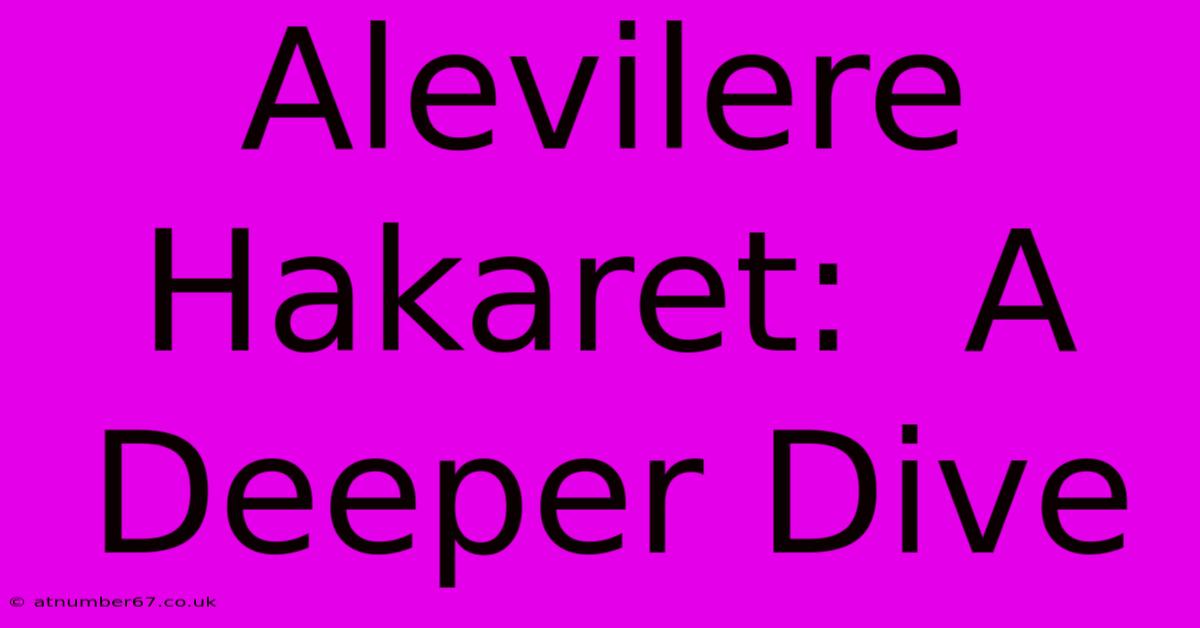Alevilere Hakaret: A Deeper Dive

Table of Contents
Alevilere Hakaret: A Deeper Dive into the Roots and Ramifications of Anti-Alevi Sentiment in Turkey
Alevism, a mystical branch of Shia Islam, has a long and complex history in Turkey. However, Alevis have historically faced significant discrimination and prejudice, often manifested as overt insults and hateful rhetoric – Alevilere hakaret. This isn't simply a matter of casual bigotry; it's a deeply rooted issue with serious social, political, and even economic consequences. This article explores the historical context, the forms this hatred takes, and the ongoing struggle for recognition and equality.
The Historical Context: Centuries of Marginalization
Understanding Alevilere hakaret requires examining the historical context in which Alevis have been positioned. For centuries, they've been marginalized and systematically excluded from mainstream Turkish society, often subject to persecution and violence. The Ottoman Empire, while initially more tolerant, saw periods of intense oppression, particularly under certain Sultans. This historical marginalization fostered a climate of distrust and prejudice that continues to impact modern Turkey. The establishment of the Turkish Republic, though promising secularism, failed to fully address the deep-seated inequalities. Alevis were frequently excluded from positions of power and influence, their cultural practices often denigrated and suppressed.
The Role of Political Discourse
Political discourse has often played a significant role in fueling Alevilere hakaret. Certain political narratives, often rooted in conservative interpretations of Sunni Islam, have deliberately pitted Alevis against the dominant majority, reinforcing stereotypes and prejudices. The use of inflammatory language and the dissemination of misinformation have significantly contributed to the climate of intolerance. This manipulation of narratives for political gain has had devastating consequences for Alevi communities.
Manifestations of Anti-Alevi Sentiment: From Subtle Bias to Overt Violence
Alevilere hakaret manifests in various forms, ranging from subtle everyday biases to overt acts of violence and hate speech.
Subtle Forms of Discrimination:
- Stereotyping: Alevis are often stereotyped as being less religious, uneducated, or even unpatriotic. These stereotypes, frequently perpetuated in the media and casual conversation, contribute to their marginalization.
- Exclusion: Alevis may face subtle but significant forms of exclusion from social, economic, and political spheres. This can include difficulties in accessing education, employment opportunities, and even social circles.
- Microaggressions: Daily interactions can be marked by microaggressions – subtle, often unintentional acts of discrimination – that cumulatively erode the sense of belonging and respect for Alevi individuals.
Overt Acts of Hatred:
- Hate Speech: The internet and social media platforms have become breeding grounds for hate speech targeting Alevis. This can range from derogatory comments and insults to outright calls for violence.
- Physical Violence: Unfortunately, there have been instances of violence and attacks against Alevis, often motivated by religious hatred.
- Destruction of Alevi Cemevis: Attacks on Alevi places of worship, Cemevis, represent a particularly egregious form of hate. These attacks are not merely acts of vandalism; they represent a direct assault on Alevi religious identity and community cohesion.
Combating Alevilere Hakaret: The Path Towards Equality
Addressing Alevilere hakaret requires a multi-pronged approach. This includes:
- Education and Awareness: Comprehensive education programs that accurately portray Alevi history and culture are crucial in countering prejudice and promoting understanding.
- Legal Reforms: Strengthening laws that protect Alevis from discrimination and hate crimes is essential. Effective enforcement of these laws is equally crucial.
- Media Responsibility: The media must play a responsible role in promoting accurate and respectful portrayals of Alevis, avoiding the perpetuation of harmful stereotypes and hate speech.
- Political Will: Political leaders must actively condemn Alevilere hakaret and work towards creating a more inclusive and equitable society. This includes meaningful steps to address historical injustices and promote Alevi rights.
The fight against Alevilere hakaret is a fight for justice, equality, and social harmony in Turkey. It requires sustained effort from individuals, communities, and institutions alike. Only through a collective commitment to understanding, respect, and inclusion can a truly equitable society be built.

Thank you for visiting our website wich cover about Alevilere Hakaret: A Deeper Dive. We hope the information provided has been useful to you. Feel free to contact us if you have any questions or need further assistance. See you next time and dont miss to bookmark.
Featured Posts
-
Jurassic Age Dti The Prehistoric Power Within
Apr 03, 2025
-
Daughter Of Zion Finding Strength In Faith
Apr 03, 2025
-
Raha Kapoor The Princess Of Bollywood
Apr 03, 2025
-
Toto Wolff S Net Worth A Guide To Financial Success
Apr 03, 2025
-
Son Of A Rich The Secrets Of A Successful Heir
Apr 03, 2025
